As the United Nations prepares to ratify new global development goals, a new Pew Research Center survey finds that people in major sub-Saharan African nations are feeling more optimistic about the future than many others around the world. Having experienced relatively high rates of economic growth in recent years, African publics are more likely than citizens of many wealthier nations to believe their economies will improve in the short run, and that in the long run the next generation will be better off financially.
Nonetheless, throughout sub-Saharan Africa people recognize that their countries face tremendous challenges. Even though extreme poverty around the world has been cut by more than half since the last round of UN development targets (the Millennium Development Goals) were adopted in 2000, economic challenges persist, especially a lack of jobs.1
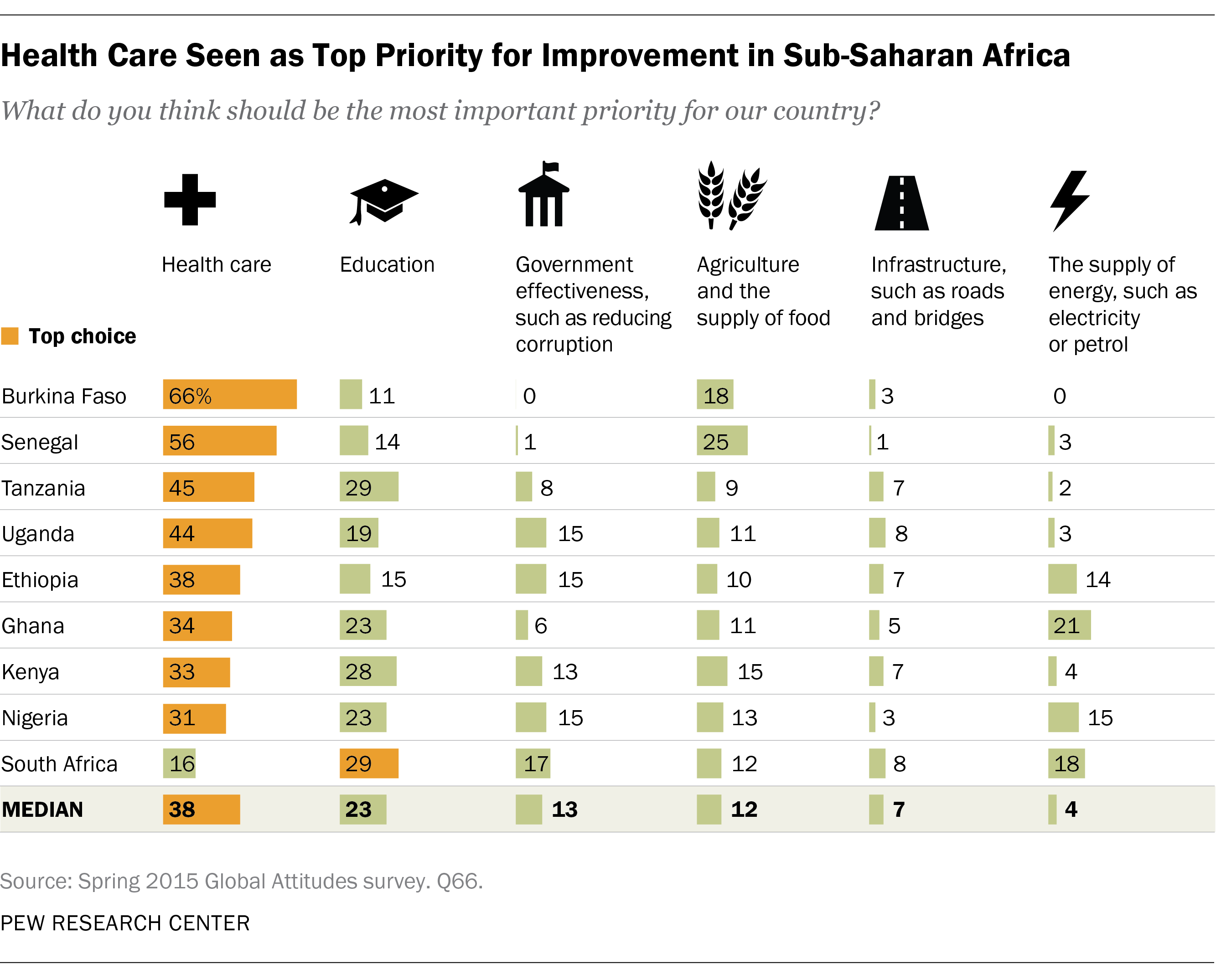
Asked which of six pressing issues should be the most important priority for their country, a median of 38% across the nations polled name health care, including more than four-in-ten in Burkina Faso, Senegal, Tanzania and Uganda. In eight of nine countries, improving health care is the number one priority.
Education is also an important concern. A median of 23% say improving education should be their nation’s top priority. In South Africa, education is named more often than any other option. To a lesser extent, people in the region are also worried about issues such as corruption, food supply, infrastructure and energy.
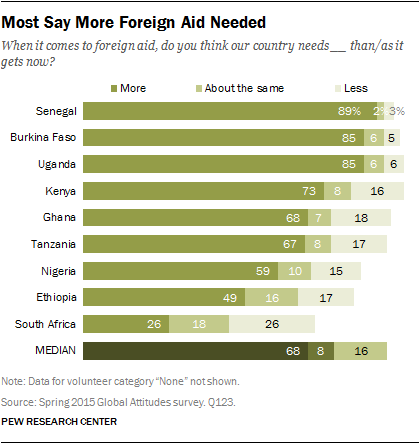
These are among the key findings of a new Pew Research Center survey, conducted in nine nations among 9,062 respondents from March 25 to May 21, 2015. Pew Research Center is a subsidiary of The Pew Charitable Trusts, its primary funder. This report was made possible by The Pew Charitable Trusts, which received support for the survey from the Bill & Melinda Gates Foundation.
Development in Africa
Confidence in Government, Aid Groups, Private Sector, but Concerns Too
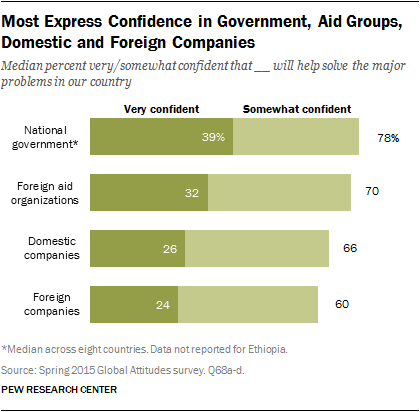
Overall, people in the region express at least some confidence that major institutions will be able to deal with the challenges facing their countries. Most believe that governments, foreign aid organizations and businesses can help solve key problems. However, people believe that these institutions have both important strengths and significant weaknesses.
In most countries polled, people express the greatest faith in their own national governments. A median of 78% across the eight countries where the question was asked say they are at least somewhat confident that their national government will help solve major problems in the country.
Foreign donor groups also receive largely favorable ratings. A median of 70% across all nine countries surveyed are at least somewhat confident that these organizations can help solve major problems in their country, including majorities in every nation polled. A median of 68% describe foreign aid programs as effective and 60% say they benefit people in need. Still, these positive views are tempered with doubts. Smaller, yet still significant, shares perceive these foreign assistance programs as corrupt (median of 53%) or inefficient (45%). And there is no country in which a majority is very confident in international aid organizations.
Most also believe the private sector can help address the challenges facing their country. A median of 66% express confidence in domestic companies, and 60% say this about foreign businesses.
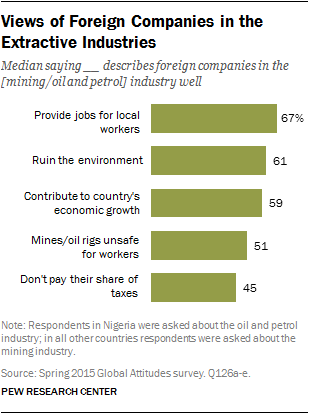
More specifically, foreign companies involved in extractive industries are seen in a mostly positive light. In eight nations, respondents were asked about the impact of the mining industry in their country, while in Nigeria, where oil is a major export, people were asked about the oil and petrol industry.
In all countries, more than half say these companies are having a positive impact, including about seven-in-ten or more in Kenya, Nigeria and Uganda. A median of 67% across the nations polled say extractive companies are providing jobs for local workers and 59% believe they contribute to economic growth.
At the same time, as is true for the government and nonprofit sectors, people have some concerns about these for-profit industries as well. A median of 61% believe foreign extractive companies in Africa are causing environmental damage, while about half (51%) say the mines and oil rigs are unsafe for workers and 45% say these firms do not pay their share of taxes.
Economic Optimism in the Short, Long Term
The survey finds that, compared with other parts of the world, people in sub-Saharan Africa are feeling relatively positive about the economy. Many nations in the region have enjoyed strong growth in recent years, and it is clearly having an impact on public attitudes.
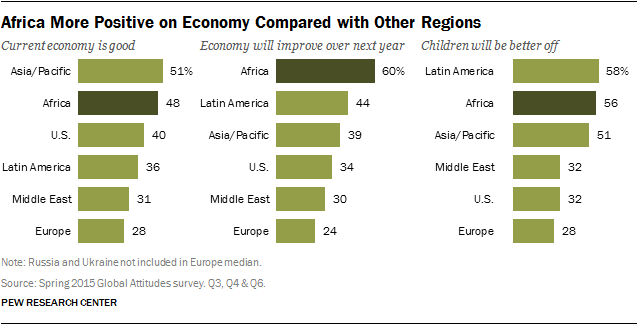
Across the nine nations polled, a median of 48% say their national economy is in good shape. While still less than half, this is a significantly higher share of the public than in other parts of the world, with the exception of the Asia-Pacific region. Positive economic ratings are especially common in Ethiopia, Senegal, South Africa and Nigeria, where majorities believe their country is doing well economically. (For more on global public opinion on economic issues, see this recent report based on Pew Research Center’s 40-nation Spring 2015 survey, which includes the nine countries featured here.)
And when asked about the near-term economic future, sub-Saharan Africa is the most positive region of the world. A median of 60% believe their nation’s economy will improve in the next 12 months. Latin America is a distant second at 44%, and Europe trails the world at 24%.
Globally, optimism about the economic future is closely linked to a country’s recent economic past. Nations that have enjoyed strong gross domestic product (GDP) growth since 2005 also tend to be more optimistic about the financial well-being of the next generation. Overall, there is a 0.75 correlation between a country’s average GDP growth from 2005 to 2014 and the share of the public who think today’s children will be better off financially than their parents.
In African nations that have experienced high growth rates in recent years, such as Nigeria, Ethiopia and Burkina Faso, large majorities believe the next generation will be better off. The same pattern is found in Asian nations that have had strong growth, like China, India and Vietnam.
In contrast, many wealthy nations that have struggled with the Great Recession and its aftereffects are relatively pessimistic about the future. For example, in France, Italy and Japan, less than 20% say children in their country will surpass their parents financially.




